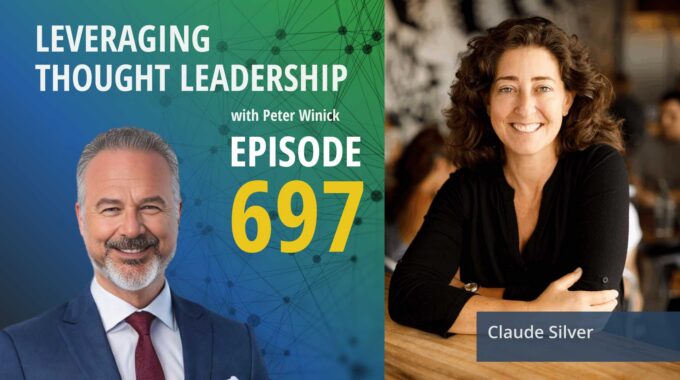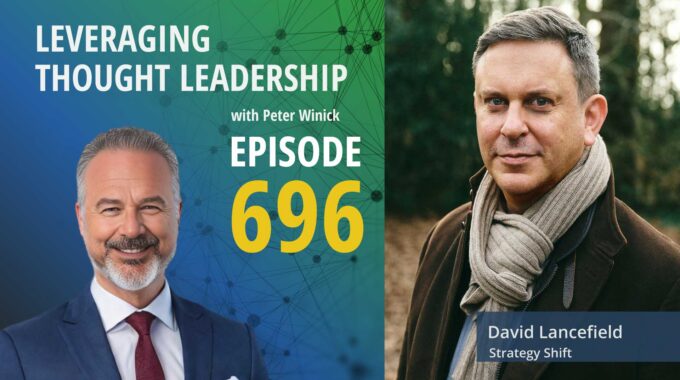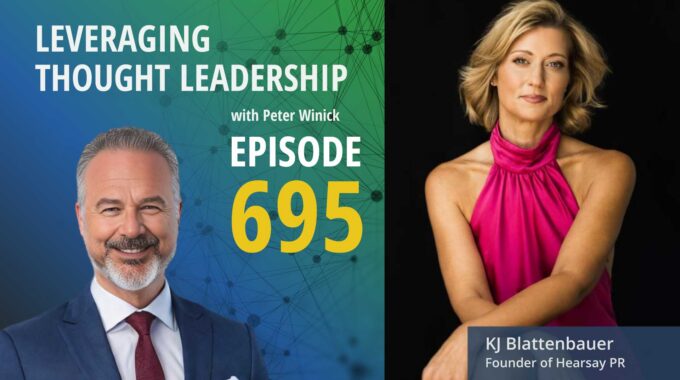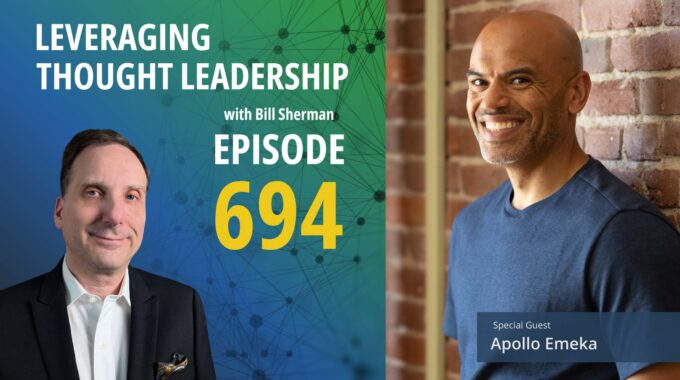Frameworks for connection, accountability, and performance This episode examines how psychological safety drives performance, how…
Leveraging Thought Leadership With Peter Winick – Episode 198 – John Jantsch
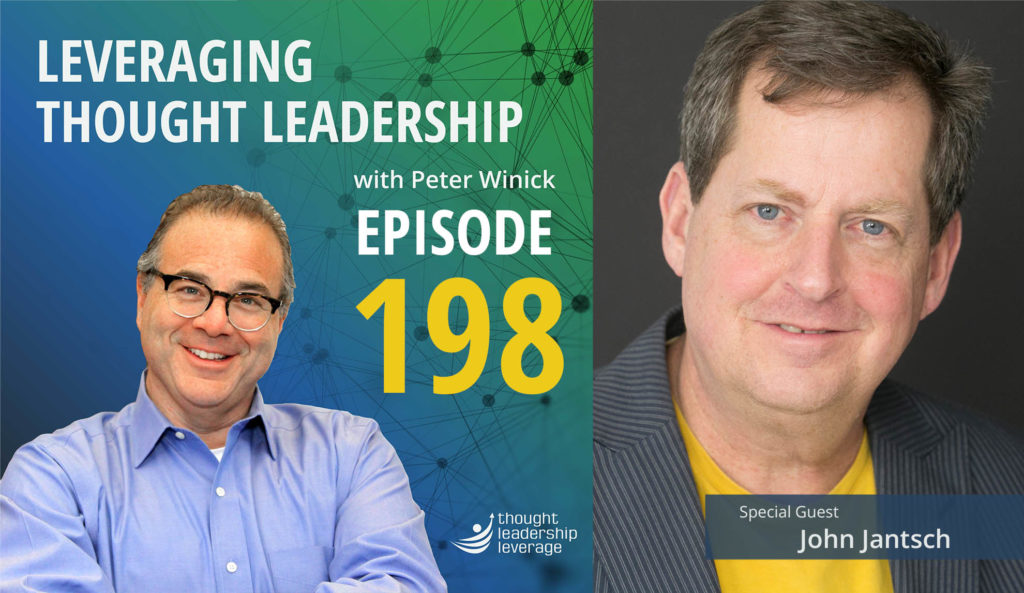
Business advisors often say, “Once you’ve found your lane, stick to it!” But what happens if you discover a message outside that lane – and you just have to get the word out?
John Jantsch, today’s guest, is the Founder of Duct Tape Marketing Consultant Network. He hosts the Duct Tape Marketing podcast, and is author of two great books: Duct Tape Marketing and Duct Tape Selling. His new book, The Self-Reliant Entrepreneur, takes a step away from the Duct Tape Brand and puts full focus on creating the “entrepreneur mindset.”
John shares tips on the art of growing your network by taking unpaid speaking opportunities, thus speeding up the sales cycle for consultant engagements. John and Peter discuss the risks and rewards of stepping outside your “niche,” and wrap up by discussing ways your network should deliver your message, and the investments necessary to ensure your message is consistent – regardless how (or by who!) it’s delivered.
John’s new book provides evergreen tips, information, and ideas – content that will never go out of style. Do you know what makes an asset evergreen?
Transcript
Peter Winick And welcome, welcome, this is Peter Winick. I’m the founder and CEO of Thought Leadership Leverage, and you’re joining us on the podcast today, which is Leveraging Thought Leadership. And today my guest is John Jantsch. John’s a rock star in this space. I’ve been following John’s work for longer than I can admit, probably at least 15 years, maybe longer. So I’ll give you his official bio, and then I’ll get you some more accolades. So John’s marketing consultant, he’s a speaker, and he’s the author of Duct Tape Marketing, Duct tape selling, the commitment engine. SEO for growth and the referral engine. He’s the founder of the Duct Tape Marketing Consultant Network. His latest book, The Self-Reliant Entrepreneur, 366. Daily Meditations to Feed Your Soul and Grow Your Business is a daily reminder to entrepreneurs that a better you makes a better business. So John’s sort of a legend in the business and I’m really happy that he is choosing to spend some time with us today. So welcome aboard, John.
John Jantsch Well, thanks, Peter. And I give your audience a little hint at my age. That soundtrack that you queued up there to start us off was from a movie I saw in high school.
Peter Winick Oh, so if you didn’t hear it, that was staying alive. So we got to do the math that’s in the 70s, carry the one. Yeah, so you’re not a millennial. I’m going to go with that, but we’ll just leave it at that.
John Jantsch That’s right.
Peter Winick Anyway, did you have the wetsuit? The one with St. Oliver.
John Jantsch No, no, I didn’t really participate in the disco movement.
Peter Winick Good, there you go, more Almond Brothers anyway. So you’ve been at this a while, so I want to talk a little bit. You’ve got a new book that came out, But this is your, what number book, six, seven, eight?
John Jantsch Sucked my checkbook, yeah.
Peter Winick So let’s just talk a little bit about sort of when you made the decision to publish the last book, what goes through your mind that’s different than when, you know, your first or second book in terms of how to choose a publisher, the marketing, all that fun.
John Jantsch Yeah, so you’re absolutely right. A lot of things. I mean, you know, fortunately, a few of my books have sold okay. So, I am able to attract the attention of the, you know traditional publishers that know my work. So that makes, you know, that always makes life a little easier in this game. But I will say that this… topic was so different for me. My other books are squarely how to do some aspect of marketing. This book is really more why to, you know, how to show up as an entrepreneur, how to stay inspired. I mean, it’s definitely, it is a daily format. I mean, everything about it is different than my past works. And so, a couple things, you know. We went to, we ended up going to a different publisher who really said, Yeah, I want this book. I was with Portfolio in kind of my three books prior and this book is published by Wiley and a lot of that had to do with the fact that they have an editor there that just really wanted anything for me in a way. That’s probably overstating it, but it was willing to take a risk on maybe a completely different book, I should say, from me. And I will say that one of the things that has been challenging from a marketing standpoint, but also a lot fun. is that for this book to truly achieve its potential, I have to get outside the marketing bubble. This book has entrepreneurs, startup, coaching, maybe even some spiritual shows and things that would be interested in this work. And so, I’m talking to people that I haven’t spoken with that don’t know my name. They don’t think, okay, duct tape marketing, sure, I’ll have you come talk to our people, and so.
Peter Winick So I want to go there for a minute, because I mean, there’s a bit of an irony that you’re a marketing guy. So one of the things that I do a lot of work on with my clients, and we arm wrestle over this a lot early on, is listen, we’ve got to define your platform. We’ve got a solve for X. And to me, X is you’re the X guy. So if somebody mentions your name to me I’m like, oh, you’re Duct Tape marketing guy. Period. Full stop. And that’s not an accident that you’ve burned that into my brain. Right. I’ve read several of your books. You follow your stuff. You’ve out there in a long time, branding, et cetera, et cetera. Now you come out there and you throw this 365 daily meditations and I’m like, whoa, okay, kind of not what I expected. I trust you. I like your work. So I’ll give you a shot. But at some level violates a lot of what I work with my clients on saying, listen, you got to stay in your lane. You build your followers, you build your tribe. They’re expecting a certain message from you. It doesn’t have to be exactly on point. But Tell me about sort of the wrist that you took. This is pretty, pretty radical. risk because people were expecting duct tape fill in the blank, right? As the next thing from you. And it probably would have been an easy runaway bestseller.
John Jantsch Well, I’ll let you down a little bit on this. The duct tape reapplied is actually going to come out in 2020. Good. Good. Good. It’s just a new addition. I mean, it is a major evolution of the point of view and all the tactics. So, I certainly haven’t abandoned that, but in a lot of ways, as a creative – Um, as a human being, uh, the risk for me was in not writing this book. This is a book that I’ve been in some ways working on and maybe it’ll just be a gift, you know, to the people that find it, but it’s a book I’ve been working on myself for 20 years. I think entrepreneurship is one of the great personal development programs ever created. Yep. And so this book reflects a lot of my own personal development. And so every now and then we write a book because we feel like we have something to say.
Peter Winick I love that. No, no, no. So it’s true. So again, when we’re talking to folks around, why are you writing this book? A lot of your other books, it made sense, right? This is your domain expertise. People know that you have gravitas and you have something to say here, et cetera. But there’s nothing wrong, obviously, with writing a book that’s, you know, one of the reasons you were put on this planet is to get this book out, right. and it was gnawing out you for a long time and maybe the value prop or the marketing position is not exactly where one would, your former publisher might have liked, but you just said, I got to get this out. So it’s interesting how that, how does that playbook differ from the next duct tape book that would be coming out? What’s different about this for you from a marketing?
John Jantsch Well, what I first mentioned is that, you know, certainly I went out to my network of folks that had heard of duct tape marketing and they were like, sure, John, come on the show. You know, what’s this book about? But I’m also, I was on a meditation radio program the other day, you know, that particular host had never heard of Duct Tape Marketing, but, you
Peter Winick Alright, I had to ask.
John Jantsch No, the program about meditation, you know, and things related. So there’s a side of me that, you know that this is definitely more personal side of business. It’s certainly related to business. I’ve worked with thousands of entrepreneurs over the years that, you know, are getting the life sucked out of them because they don’t have the right mindset. And so this book, in some ways, you know, certainly addresses that mission that, that I’ve had with my marketing. with entrepreneurs, but it’s a book that we joked about my age. I’m actually 59. It’s a book that because of the format, because it features a tremendous amount of writing for the mid-19th century, I don’t think it’ll ever go out of style. There’s nothing in it that’s going to get dated. And so, it’s book that maybe I continue to… nurture and kind of pursue, you know, at a point, at some point when I decide out, you know what, I’m done doing the showing up every day and doing marketing.
Peter Winick Right. So a little more evergreen. Let’s, so that was really helpful, John, because, you know, again, a little, a little bit unusual, you sort of moving away from your core, but I love that. I want to, I want a pivot for a moment to the other thing that you do a lot of, which is, which has keynote speaking. So let’s just talk at first generally around how that business is changing and evolving and how, what you need to do that’s the same and what you need to, that’s different in order to win it there.
John Jantsch Yeah, so I actually kind of backed into that. And what I mean by that is that I, when I was building my practice, my business originally, I found speaking is absolutely the best way to get clients. So, you know, I would go and speak for free and, you know, there would be 50 prospects in the audience who would say, this person seems to know what they’re talking about. And there was some way for them to get a hold of me. And so that was how I started. And I still today teach people to do that. I think it is one of the greatest ways to speed up the sales cycle for somebody to meet you, like what you have to say, level of trust.
Peter Winick When it’s just easy math, you know, what does it cost me to speak, right? What’s my customer acquisition cost? Same marketing metrics we would use anywhere else. And if it’s an effective tactic, go for it. Then you do more. So that’s cool. Yeah. And so how’s that changed? You
John Jantsch Well, so, you know, obviously I started doing that, then people started offering me money to do it and I started traveling to do. And then my first book came out and all of a sudden people offered me a lot more money to do and a lot in demand. And so, to me, obviously, the book served well, but the book also led to a lot of opportunity beyond just the sales from bookstores. So that reputation and staying out there and continuing to publish works has kind of kept that going. I’ve stayed in the small business space, so I’m not doing the corporate annual meeting kind of events. And so in some ways, maybe it’s my own limiting belief, but you’re kind of capped in terms of the upper range fee if you’re speaking for a manufacturer, for their distributors or an association or something like that. You are a little limited, but it also leads to other opportunities now for my consultant network and for getting clients for them as well.
Peter Winick If you’re enjoying this episode of Leveraging Thought Leadership, please make sure to subscribe. If you’d like to help spread the word about our podcast, please leave us a review and share it with your friends. We’re available on Apple Podcast and on all major listening apps, as well as at thoughtleadershipleverage.com forward slash podcast. So let’s talk about that for a minute, because I think what I’ve observed, certainly, is there’s lots of different reasons to speak. So you speak for free, you find new clients. That’s awesome, right? Then you get paid to speak in different markets. As you mentioned, the association of manufacturers of wingnuts isn’t going to have the budget that Oracle is going to have for their sales. So there’s different price points there. So I think the other… piece that you need to think about when it comes to speaking is why. So if you’re doing it for the fee, that’s awesome. Then you want to maximize your fee. If you’re going to get for exposure, do you have the right mix of product services and solutions? So in your case, you’ve got a consulting network, so, you know, if you get in front of a certain avatar, it’s going to generate leads for that. So, so tell us how do you balance your product mix against the ideal audience to help you make those decisions.
John Jantsch Well, you know, I’d like to say I have a grand plan. Sometimes you just kind of look for opportunities and you pursue them. But I do think that I’ve done, if I’ve anything well, I’ve I’ve done a good job at seeing how all these things integrate. Yep. You know, my books, my podcast, my blog, the speaking, the fact that I have a consultant network that’s out there, also promoting duct tape marketing. All of those things kind of support each other. And increasingly, because the network has grown to be such a significant part of what we do, increasingly as we develop training and even product offerings, in 2020, we’re going to take a pretty big leap into training internal hires. So instead of just promoting the business owners, we are going to go after that certified marketing manager that companies are hiring and they don’t know what to do with. We’re going to help teach them and help train them and actually help support. them. So that’s a whole new market we’re going to tackle. But as we develop new markets or new approaches, new programs, I’m always thinking about how’s this going to impact our small business consulting? How’s this gonna impact our network? So a lot of times I’ve chosen to kind of develop new things with a market. So if I have small business owners as readers and I want to develop a training program, I’ll start with them. Say, okay, what do you need? Let’s develop this. How would you like this delivered? Same with this new initiative.
Peter Winick So I want to talk about that first for a second though. So it seems so obvious, right? So I’ve got a market of techs. They like me, they’re loyal. You’re constantly, you’re generous, right. You’re giving them the podcast. You’re doing them blog. You’re putting a lot of stuff out there. And then what happens is far too many people say, aha, the light bulb went off in the shower. Well, that’d be in my sleep or whatever. And I have a vision for certification or a video or an app or whatever, I’m gonna go build it and then sell it. And I think They’re missing the key point. If you ask your market what they want and you have to give them some framing around that, it can’t be just a totally open.
John Jantsch Yeah, because you’re going to be willing to do some weird stuff if you do that.
Peter Winick Yeah, but they’ll tell you and then it just it’s just from a risk management Like if you get a thousand followers saying yes, I would buy that sweater for you and you John and you we’re gonna make it in Pink, holy cow. That’s a no-brainer. But why don’t enough thought leaders and speakers just do
John Jantsch You know, first off, I need to tell you that I had a couple failures that taught me that lesson. So, you know, I didn’t just wake up one day and think I’m smarter than everybody else. But I do think there is a little bit of that, you, know, we get really sold on our own stuff. You know? We have a really good idea. How can people tell us it’s a good idea? And so we just, you now, we go out there and say, aha, I’m going to seize the market. And in some ways, you know, sometimes what happens… is you may have the hit on the right solution, the thing that people need, but you just don’t know how to communicate it in a way that the market says, oh yeah, that solves the problem I have. So it’s not just the product itself. It’s the, how do we talk about it? How do we message it? What problem does it actually address? Because that’s where we get in trouble, is we try to solve problems that A, don’t exist or that people don’t know they have.
Peter Winick The other thing people do is they say, well, you know, you say, well, what’s the comparable? What will this replace? What’s the incumbent? Oh, no, this is all new. It’s like, it’s far easier to sell something that has an incumbent and say, yeah, you’re buying X. My Y is just a better, quicker, cheaper, faster version of X. And let me tell you about that because that means it already has a budget and you know you got to make it easier for the buyer to get their head around.
John Jantsch Yep. Yep. I mean, the sad thing about it is, you know, there certainly have been innovations that rocked markets, you know.
Peter Winick Yeah, of course.
John Jantsch And so people look at that and think, I’m going to do that. I’m gonna make the next iPhone. But yeah, that’s harder said than done.
Peter Winick So John, you’ve got a bit of a different model than most where you’ve got a network of consultants and lots of speakers speak in order to generate direct consulting business. But you’ve now packaged sort of the models, the frameworks, the methodologies, uh, underneath your consulting process and have others doing the delivery through the network. So tell me sort of why you made that choice, how that works for you. Um, the good, the bad, the ugly.
John Jantsch Yeah. Well, it works on a couple of levels. First off, I kind of backed into it. In other words, I was selling a course. I was doing some consulting, but I was also doing a lot more speaking and writing. And so, not really finding the time to do the consulting. I didn’t want to build a large organization. People started, independent marketing consultants and agencies started coming saying, hey, we want to use your course, your methodology, your materials to work with business owners. I, like I said, I kind of backed into that and created the Duct Tape Marketing Consultant Network. We have about 150 consultants around the world today that are now working with, you know, at any given time, you now, thousands of small businesses. So, in a lot of ways, it did allow me to kind of further my mission of helping small businesses, but it also kind of took us out of building a consulting organization. The good, Rod, the ugly, the good is, I mean, I’ve got, you know, ambassadors, they support the mission. You know, they are actually, you now, working with small business owners, they’re great, great people that love collaboration. So in a lot of ways, it’s been really fun to build a network that, between me, is less about me now than it certainly was because now, you, know, the contribute and they’re starting to create their own IP and things of that nature.
Peter Winick So what’s interesting about that is that the classic model of, you know, John’s the rock star, John is the author, John the dude, right? And then you book John, you pay a whole bunch of money for that because you get a premium for that is different than when they have the trust and faith in the network to book, you know Fred and Cleveland or whoever and realize that as being part of your network, the burden is on you, John, to have screened and validated, make sure he’s quality, make sure there’s some consistency in terms of following a framework and methodology. So what’s the? you know, any of the challenges in terms of, because I’ve seen other folks do this with coaching networks where there’s like any business that’s good and bad, but you know finding the right people to follow in the right way and deliver a way that satisfies clients.
John Jantsch Yeah, I think the, you know, those are some of the key points, but it also, I think for us, we learned that we’ve got to build infrastructure around it. I can’t guarantee that somebody’s going to deliver exactly like I would, you know, in every situation, but the more training, the more connecting, the more real in-person events that we do, the more support that we can give. You know, it helps maintain the quality of what our point of view is or how we would do it, you know, kind of thing. But obviously, that takes staff and that takes a willingness to invest in. days of in-person events and things. So in some ways, it comes at a price. And the other option certainly is that there are people out there that sell the weekend certification training course and good luck, where I think those have a bigger challenge I think it’s harder to build true momentum with those, but also you really give away, you know, there is no quality control. You’re not putting your name on that necessarily.
Peter Winick Exactly, exactly. And I would also say from an organizational perspective, you need to change your focus and say, yes, we care about the end user, right? The guy that’s got the mid cap company in Denver, we’re going to help, but actually we’re of service to these consultants to make them successful. And we have to support them. So you have to sort of change sort of what you’re doing and how you’re doing it, what their needs are, and how you can help them from a marketing branding.
John Jantsch Completely, and between you and me, that’s a lesson we had to learn.
Peter Winick Yeah, yeah, who’s the customer?
John Jantsch that came over time because you know when I first started the network as I said it was kind of like oh sure here’s another arm of the organization but we’re still out here promoting our products and services and you know it’s almost like we’ve got this channel but now we’re competing with the channel and so yeah that’s a problem that causes a little bit of grief but you’re absolutely right the network the members of the network if we can make them successful you know our job of getting more of them and all those things just gets a lot easier.
Peter Winick Well, this has been great, John. We’re running out of time here. Final thoughts, reflections, or maybe, shall I say to T, of the new book, Meditations, might just perhaps feed somebody’s soul.
John Jantsch Well, I feel like I need to tell them where they can buy the book with that, but I’m not sure that’s what you’re really asking me.
Peter Winick Well, we know we get on Amazon and elsewhere, but no, I was just sort of any final thoughts because you’ve you know, I love the cards that you took with this new book outside of the domain and you know what you’ve built over the years. But any thoughts to budding to buddying duct tape marketers?
John Jantsch You bet. I mean, as business owner of any, whether you’re a duct tape marketer, you’re a plumber, you know, a consultant, whatever it is that you choose to do. I think as entrepreneurs, I think we have to realize that all the information for how to do what we need to do is out there already. You know, YouTube, video, anything these days. So the part that’s sometimes missing is the mindset. You got to go to work on yourself. make yourself a better leader, make yourself more educated. I mean, just keep growing is part of the practice, I think, of being an entrepreneur.
Peter Winick I love it. Well, thank you so much. I appreciate your time. I appreciate sharing the journey the way you did with us today. And best of luck in all that you do. Thanks so much
John Jantsch All right, my pleasure. Thanks for having me, Peter.
Peter Winick To learn more about thought leadership leverage, please visit our website at ThoughtLeadershipLeverage.com. To reach me directly, feel free to email me at peter at Thought Leadership Leverage.com and please subscribe to Leveraging Thought Leadership on iTunes or your favorite podcast app to get your weekly episode automatically.


